Simple Authorization Letter
[Recipient Name] [Recipient Address]
Authorization Letter
I, [your name], hereby authorize [Mr. John Smith] to [authorization actions, example: sell my car, sell my house, withdraw money from my bank account number xxxxxx, etc.….] excluding [excluded actions, specific things that you don’t want to authorize] starting from [start date] till [end date or empty].
[Mr. John] may sign all necessary documents and perform related actions within the scope described in this letter.
The authorized person’s identity proof details and signature are provided below for your reference and verification purposes.
Authorized Person: [Mr. John Smith]
Identity Document: [Passport]
Identity Document Number: [123456789]
Authorized Person’s Signature:
Authorized Transactions: [withdrawals, deposits, loan settlements, etc.….]
Unauthorized Transactions: [fixed deposits, etc.…]
Start Date: [start date]
End Date: [end date]
Sincerely,
Sample authorization letter to issue a bank statement
Your Name
Your Address
Your Contact Details
Bank Name
Bank Address
Subject: Authorization Letter
I am writing to give permission to [my wife Jennifer Smith], identified by passport number [123456], to issue and receive bank statements from my savings account at [the United Bank], identified by account number [789456] under the name of [your name].
This authorization is valid from [start date] till [end date].
[List of exclusions if any].
Sincerely,
Transaction Authorization Letter: sample authorization to allow someone to withdraw cash from your account
Your Name
Your Address
Your Contact Details
Bank Name
Bank Address
Subject: Authorization Letter
This letter is to authorize [Mr. John Smith], my cousin and identified by ID number [123456], to withdraw cash from my current account number [45268] at [the Federal Bank].
[Mr. John] may withdraw no more than [$30,000] in a single calendar month. This authorization is valid from the date of this letter till [end date] or otherwise explicitly invalidated.
[List of exclusions if any]
* [Mr. John] may not set up standing orders to transfer funds.
* Funds may only be withdrawn in cash.
* [Other Exclusions]
Sincerely,
Sample authorization to allow someone to collect or pick up a cheque book, credit card, or ATM card
Your Name
Your Address
Your Contact Details
Bank Name
Bank Address
Subject: Consent Letter
I, [your name], holder of account number [123456] at [the Allied Bank], hereby give my written permission to [Mr. John Smith], holder of passport number [78645], to collect my [cheque books, credit card, etc.] from the bank.
This is a one-time authorization which is valid only till [end date].
Sincerely,
Sample authorization for signing authority
Your Name
Your Address
Your Contact Details
Bank Name
Bank Address
Subject: Signing Authority Grant Letter
This letter is with regards to bank account [547896] under the name of [your name].
I hereby give full authority to [Mr. John Smith] to sign documents pertaining to the above-said account and to represent me and act on behalf in my relationship with the bank.
This authorization is not transferable.
Mr. John's identification details are listed below for verification purposes.
Sincerely,
Sample authorization for encash a cheque
Your Name
Your Address
Your Contact Details
Bank Name
Bank Address
Dear Bank Manager,
This is to authorize [Mr. John] (ID number 45680) to encash cheque number [566] (amount is $8000) that is issued to me by [issusing party name] on [cheque date].
I kindly ask you to facilitate the fund transfer process as described therebefore.
Sincerely,
Sample Authorization to Collect or Pick Up documents, a certificate, or a shipment
Your Name
Your Address
Recipient Name
Recipient Address
Dear [Recipient Name],
My name is [your name], a client of [company name]. I was supposed to pay a visit to your office
to collect [some documents or shipment].
Due to an unexpected situation, I will not be able to show up, instead, I will be sending my
friend [Mr. John] to pick the documents/certificate on my behalf.
[Mr. John]'s ID number is [7894]. Please make sure that he and only he receives the shipment and completes the necessary paperwork pertaining to it.
Sincerely,
Sample Authorization to allow someone to recieve a shipment for you
Your Name
Your Address
Recipient Name
Recipient Address
Dear [Recipient Name],
My name is [your name] and I am expecting shipment number [12346] from you on [some date].
I may not available at the time of delivery, so I request from you to hand over the goods to [Mr. John Smith] instead.
I kindly ask you to verify the identity of the receiver upon delivery. Thank you for your understanding and cooperation.
Sincerely,
Sample Authorization for collecting money, salary, or a payment
Your Name
Your Address
Recipient Name
Recipient Address
Dear [Recipient Name],
With regards to my [end of service] payment, I hereby grant [Mr. John Smith] the permission to collect the money and to sign over the corresponding receipts on my behalf.
Attached to this letter is a copy of [Mr. John's] ID for verification purposes.
This is a one-time authorization to collect a single payment.
Sincerely,
Authorization Letter To Use Credit Card or ATM Card (in third person)
Your Name
Your Address
Recipient Name
Recipient Address
On [some date], [Mr. John Smith], identified by passport number 12346, has given his consent to the use of his credit card by [Mr. Jacob Black], identified by passport number 9651651. This authorization is subject to the below terms:
1) Validity: from [start date] till [end date]
2) Limit: a maximum amount of 3,000$ in total
3) [Other conditions go here]
Sincerely,
Sample authorization letter for medical treatment
To: [Hospital or Doctor Name],
I [your name] hereby authorize [Dr. John Smith] to perform [procedure or treatment name]
on [my son, daughter, etc.] on [some date].
I acknowledge that the risks involved with this treatment have been explained to me and I am
aware of the possible complications that could arise as a result.
Sincerely,
Sample authorization letter for providing medical treatment or giving medicine to child at school
To: [School Name],
I, the parent of [student name], hereby give permission to the [The National School]'s medical
team to provide the required medical assistance to my child in the event of an emergency and when
I'm unreachable, which includes prescribing medicine or taking [him/her] to the hospital
if needed.
Sincerely,
Parental authorization letter for minor to travel alone
To: [New York International Airport]
As the [legal gaurdian / parent] of [child name], American national with passport number [14528], I am allowing my child to travel unaccompanied on [his / her] their flight from [New York] to [London] on [flight date].
I confirm that my child is independent enough to travel on their own. I acknowledge taking full responsibility for this decision.
Sincerely,
Authorization Letter to Sell or Use Car
To whom it may concern
I, [your name], hereby authorize [Mr. John Smith], to sell my vehicle (described below) and act on my behalf in signing papers related to the sale transaction and in performing the necessary procedures to complete the deal.
Vehicle Details:
* Vehicle Make and Model: [Toyota Corolla]
* Model Year: [154654]
* Plate Number: [12468]
* Chaisis Number: [5959489498]
Sincerely,
Authorization Letter to Use Car
To whom it may concern
I, [your name], hereby authorize [Mr. John Smith], to use my vehicle (described below) from [start date] till [end date].
This authorization is subject to the below terms and conditions:
* Type of Use: personal, non-commercial
* Geographical area: the car may only be driven inside the city
* Damages: [Mr. John] shall bear any cost the results from misuse of the car or damages.
* [other terms]
Vehicle Details:
* Vehicle Make and Model: [Toyota Corolla]
* Model Year: [154654]
* Plate Number: [12468]
* Chaisis Number: [5959489498]
Sincerely,
Authorization Letter Sample to Sign or Process Documents
Dear [Recipient Name],
With reference to car shipment that is expected to arrive on [some date], I am delegating the
role of clearing the shipment from the customs to [Mr. John Smith] whom I'm giving herewithin the
authority to sign and process all the related documents.
Sincerely
Trademark Authorization Letter
We, [your company name], hereby authorize [Supplier Name] to use our trademark [in their advertisement, invoices, brochures, etc...] and with accordance to the general trademark usage policies outlined in [the fair trademark usage policy]. This authorization is valid from [start date] to [end date] or until the contract end date.
Business Authorization for Company Respresentitve or an agent
To Whom It May Concern:
[Example Company], a [New York] registered corporation having trade license [458964], confirms that [Mr. John Smith], who currently works there as a [job title], has been given the authority to [some action, for example, to issue a trade license] on behalf of [company name].
This authorization is considered to void if [he/she] is no longer working for [Company Name] or if the authorization has been canceled.
Details of the company and the employee are provided below for the sake of verification.
Sincerely,
Authorization Letter for Bank Transactions
[Your Name]
[Your Address]
[City, State ZIP Code]
[Date]
To Whom It May Concern,
I, [Your Full Name], holder of account number [Account Number] at [Bank Name], hereby authorize [Authorized Person's Full Name], bearing ID number [ID Number], to conduct banking transactions on my behalf.
This authorization includes but is not limited to: depositing funds, withdrawing cash up to [Amount], requesting account statements, and making balance inquiries. This authorization is valid from [Start Date] to [End Date].
The authorized person's specimen signature is attached herewith for your verification purposes.
I take full responsibility for all transactions conducted by the authorized person during this period.
Sincerely,
[Your Signature]
[Your Printed Name]
[Contact Number]
Attachments:
- Copy of my ID
- Copy of authorized person's ID
- Specimen signature of authorized person
Authorization Letter for Medical Treatment (Minor)
[Your Name]
[Your Address]
[Date]
Dear Medical Staff at [Hospital/Clinic Name],
I, [Your Full Name], parent/legal guardian of [Child's Full Name], born on [Date of Birth], hereby authorize [Authorized Person's Name] to make medical decisions on behalf of my child in my absence.
This authorization is effective from [Start Date] to [End Date] and includes consent for emergency medical treatment, routine medical care, administration of prescribed medications, and access to medical records.
[Authorized Person's Name] can be reached at [Phone Number] and carries this letter along with copies of relevant identification and insurance documents.
In case of emergency, I can be contacted at [Your Phone Number] or [Alternative Contact].
I understand that I remain legally responsible for all medical expenses incurred.
Thank you for your understanding and cooperation.
Sincerely,
[Your Signature]
[Printed Name]
[Relationship to Child]
Quick Authorization Email for Document Collection
Subject: Authorization to Collect Documents
Dear [Recipient Name/Sir/Madam],
This email serves as authorization for [Authorized Person's Name] to collect [specify documents] on my behalf from your office.
They will present this email along with their ID ([ID Type and Number]) and a copy of my ID for verification.
Please release the documents to them at your earliest convenience.
Valid until: [Date]
Best regards,
[Your Name]
[Your ID Number]
[Contact Number]
Formal Authorization Letter for Legal Representation
[Your Name]
[Your Address]
[City, State ZIP Code]
[Date]
To: [Court Name/Legal Authority]
[Address]
Subject: Authorization for Legal Representation
Dear Sir/Madam,
I, [Your Full Name], bearing identification number [ID Number], hereby formally authorize and appoint [Attorney's Full Name], [Bar Registration Number], of [Law Firm Name], to represent me in all legal matters pertaining to [Case Number/Matter Description].
This power of attorney grants my representative full authority to: appear on my behalf in all court proceedings, file necessary legal documents, negotiate settlements, access all relevant legal records, and make decisions related to the aforementioned case.
This authorization shall remain in effect until [End Date] or until the conclusion of the matter, whichever occurs first, unless revoked by me in writing.
I hereby ratify and confirm all actions taken by my authorized representative in connection with this matter.
Respectfully submitted,
[Your Signature]
[Your Printed Name]
[Date]
Witnessed by:
[Witness Name]
[Witness Signature]
[Date]
Authorization Letter for Vehicle Use
[Date]
To Whom It May Concern,
I, [Your Name], the registered owner of [Vehicle Make and Model], registration number [License Plate Number], hereby authorize [Authorized Person's Name], holding driver's license number [License Number], to operate my vehicle.
This authorization is valid from [Start Date] to [End Date] and covers the following purposes: [personal use/business use/specific purpose].
The authorized driver is permitted to drive the vehicle within [specify geographic area/restrictions] and is fully covered under my insurance policy number [Policy Number] with [Insurance Company Name].
I confirm that the authorized person holds a valid driver's license and I take full responsibility for any violations or damages that may occur during this period.
[Your Signature]
[Your Printed Name]
[Contact Information]
Copy of vehicle registration and insurance attached.
Casual Authorization Message for Package Pickup
Subject: Authorization for Package Pickup
Hi there,
I'm expecting a delivery but won't be available to receive it personally. I'm authorizing [Friend's Name] to pick up my package on [Date].
Tracking number: [Tracking Number]
They'll have their ID and a copy of this email for verification.
Thanks for your help!
[Your Name]
[Phone Number]
Authorization Letter for Property Management
[Your Name]
[Your Address]
[Date]
Dear [Property Management Company/Landlord],
Subject: Authorization for Property Access and Management
I, [Your Name], owner of the property located at [Property Address], hereby authorize [Property Manager's Name] to act as my representative in all matters related to the management and maintenance of the aforementioned property.
This authorization includes but is not limited to: coordinating repairs and maintenance, communicating with tenants, collecting rent payments, conducting property inspections, handling tenant complaints, and executing lease agreements on my behalf.
The authorized person may access the property at reasonable times for inspection and maintenance purposes. They are also authorized to sign contracts with service providers for amounts up to [Specify Limit] without requiring my prior approval.
This authorization is effective from [Start Date] and will remain in effect until written notice of revocation is provided.
All financial transactions will be documented and reported to me monthly.
Sincerely,
[Your Signature]
[Printed Name]
[Contact Details]
Professional Authorization Letter for Educational Records
[Date]
To: Registrar's Office
[Educational Institution Name]
[Address]
Subject: Authorization to Access Educational Records
Dear Registrar,
I, [Your Full Name], Student ID [ID Number], hereby authorize [Authorized Person's Name] to access, obtain, and receive copies of my educational records from your institution.
This authorization specifically covers: transcripts, grade reports, enrollment verification, degree certificates, and any other academic documentation.
The authorized person will present valid identification along with this letter. This authorization is valid for a single transaction and expires on [Date].
Please release the requested documents to the authorized person and feel free to contact me at [Phone Number] or [Email] if you require any clarification.
Thank you for your assistance.
Sincerely,
[Your Signature]
[Printed Name]
[Contact Information]
What Is an Authorization Letter and Why Do You Need One
An authorization letter is a formal document that grants another person the legal authority to act on your behalf in specific matters. It serves as proof that you have willingly delegated certain responsibilities or rights to a trusted individual. This letter is essential when you cannot personally attend to important tasks due to travel, illness, scheduling conflicts, or other commitments. The authorization letter protects both parties by clearly documenting the scope of authority granted, the duration of authorization, and the specific actions the authorized person can take. It provides legal protection and ensures that institutions, organizations, or individuals can verify that the representative has legitimate authority to act on your behalf.
How to write any authorization letter?
- Identify yourself by yourself as accurately as possible.
- Introduce the person or entity to whom you wish to grant authority.
- Mention their name, their ID number, and how they relate to you.
- Specify the scope of the authority, that is the allowed actions.
- Specify any exclusions if any. These are specific actions within the scope that you explicitly do not wish to authorize.
- Provide a starting and an expiry date if needed.
- List additional clauses as needed, for example, the transferable authority clause.
Authorization Letter For Bank
When do you need an authorization letter to your bank?
- To authorize someone to generate a bank statement on your behalf
- To authorize someone to perform transactions on your bank account (withdraw money for example)
- To authorize someone to collect a checkbook for you
- To grant a signing authority to someone so that they can sign banking documents on your behalf
- To authorize someone to encash a cheque on your behalf
How to write a authorization letter to the bank?
- List your account number and the bank name.
- Introduce the person or entity to whom you wish to grant authority.
- Mention the authorized person's name, ID number, and their relationship.
- Specify the exclusions if applicable.
- Provide a starting and an expiry date if applicable.
Authorization Sample Letter To Collect, Pick up, or Receive
As with the bank authorizations described above, the format is very much similar. The basic idea of any authorization letter is to specify two things: what is authorized and to whom.
How to write a collection authorization letter?
- Introduce yourself.
- Identiy the items that need to be collected or received. Provide as many details as possible to remove any doubt.
- List down the details of the authorized person including their name and ID number.
- If needed, provide a list of authorized actions. Those are the things that are you explicitly don't want to permit.
- Specify a time frame for your authorization. This may be needed in situations where there is risk of it being used more than once without your consent.
Health or Medical Treatment Authorization Letter (For Child)
In certain cases when, especially when risk is involved, health professionals require authorization from the relatives of the patient or the parents of the child to proceed with medical treatment. Lets us explore the format of these letters.
- Provide the patient name and details
- Provide your details and specify your relationship to the patient.
- List down the types of medical treatments or procedures that can be performed or the name of medications that can be prescribed.
- Provide a list of procedures that cannot be performed (exclusions)
- Signal your understanding of the risks involved with the procedure or the medicine.
Letter Of Authorization To Release Information
Use this letter whenever you wish to give someone access to your private information. The most common use is the release of one's medical history.
Parental authorization letter to travel with a minor or a child
You will need this letter when you want to allow your child to travel alone or with someone other than you. As per the international laws (local laws may vary), children below 18 years old may not board on a plane if not accompanied by their parents or with an authorized person. The fact that this law is not strictly enforced all of the time is another matter.
Claim Check Authorization Letter
A claim check is a receipt that you get when you handover something that belongs to you to someone else. The simplest example of a claim check is the valet parking ticket.
Corporate Authorization Letter On Behalf Of Company
More often than not, companies need to send representatives to conduct business transactions on their behalf. This practice is only possible if the organization gives its employees authorizations to perform certain activities for the company. The authorization needs to be printed on the company letterhead. Below is a sample letter that your organization can make use of to delegate access to their representatives.
What is authorization letter?
It is a letter that grants someone, Person A, the right to perform certain actions on behalf of someone else, Person B.
When is an authorization letter used or needed?
It is usually used when someone is unable or unwilling to do certain things by themselves and so choose to delegate the task to others.
Is an authorization letter a legally binding document?
Yes it is in most cases. If the person signing the letter has willingly done so (they were not forced for example) then they have to abide by it.
Does it have to be attested.
Not necessarily, however, if the authorized actions carry over huge risks, then it may be a goods idea to attest the letter with a notary. It is advisable that the authorization is witnessed by two people at the minimum.
When Do You Need to Write an Authorization Letter
- When you cannot be physically present to conduct banking transactions or financial matters
- During medical emergencies when someone needs to make healthcare decisions for you or your minor children
- When traveling abroad and someone needs to manage your affairs at home
- For collecting important documents, packages, or certificates on your behalf
- When selling or managing property and you cannot attend signings or meetings
- During legal proceedings where you need representation but cannot appear in person
- For vehicle-related matters like registration renewal, insurance claims, or selling your car
- When authorizing someone to access your educational or employment records
- For immigration or visa applications requiring a representative
- When a minor needs to travel with someone other than their parents or guardians
- For picking up prescriptions or medical reports from healthcare facilities
- When you need someone to represent you at business meetings or negotiations
Who Should Write and Send an Authorization Letter
The authorization letter must be written and signed by the person who holds the original right, responsibility, or ownership—known as the authorizer or principal. This could be:
- Account holders authorizing banking transactions
- Parents or legal guardians authorizing care for minors
- Property owners delegating management responsibilities
- Patients granting access to medical information
- Vehicle owners allowing others to use or handle their vehicles
- Students requesting record releases
- Business owners delegating authority to employees or partners
- Legal clients appointing attorneys or representatives
The authorizer must be of legal age and sound mind, with the legal capacity to grant such authorization. In cases involving minors or incapacitated individuals, legal guardians or power of attorney holders must write the authorization.
To Whom Should the Authorization Letter Be Addressed
The letter should be addressed to the specific entity or individual who will be verifying and accepting the authorization:
- Banks and financial institutions for monetary transactions
- Medical facilities including hospitals, clinics, and pharmacies
- Educational institutions like schools, colleges, and universities
- Government offices for official documents and permits
- Legal authorities including courts and law enforcement
- Property management companies or landlords
- Insurance companies for claims and policy matters
- Courier and postal services for package collection
- Embassies and consulates for visa and travel matters
- Corporate entities for business-related authorizations
- Motor vehicle departments for registration and licensing
When the specific recipient is unknown, use "To Whom It May Concern" but try to identify the department or office name whenever possible for better clarity and processing.
Requirements and Prerequisites Before Writing the Letter
- Verify that you have the legal right to authorize someone for the specific task
- Confirm the identity of the person you're authorizing with copies of their identification
- Obtain clear information about what specific actions need to be authorized
- Gather all relevant account numbers, reference numbers, or case details
- Check with the receiving institution about their specific requirements or formats
- Ensure you have proper identification documents to attach with the letter
- Determine if the letter needs to be notarized or witnessed
- Confirm the exact dates for which the authorization should be valid
- Understand any limitations or restrictions the receiving party may impose
- Prepare copies of supporting documents like IDs, ownership proofs, or registration papers
- Verify contact information for both yourself and the authorized person
- Check if there are any legal or regulatory requirements specific to your jurisdiction
- Ensure the authorized person is willing and available to perform the tasks
How to Write and Send an Authorization Letter
Start by clearly stating your intention to authorize someone in the opening paragraph. Include your full legal name, identification number, and relevant account or reference numbers. Specify the full name and identification details of the person you're authorizing.
Detail the exact scope of authority you're granting—be specific about what actions the authorized person can and cannot take. Vague language can lead to confusion or rejection.
State the validity period with clear start and end dates. If it's a one-time authorization, mention that explicitly.
Include all necessary identification information and reference numbers that the receiving party will need to verify the authorization.
Sign the letter in the presence of a witness if required, and attach copies of identification documents for both parties.
For delivery, choose a method appropriate to the urgency and formality: hand delivery with receipt acknowledgment for critical matters, registered mail for official purposes, or email for routine authorizations where accepted.
Keep copies of the signed letter and all attachments for your records.
Formatting Guidelines for Authorization Letters
- Length should typically be one page, concise yet comprehensive
- Use formal business letter format for official matters
- Font should be professional (Times New Roman, Arial) in 11-12 point size
- Include complete contact information for both parties
- Tone should be clear, direct, and professional—avoid ambiguous language
- Date the letter clearly at the top
- Use proper spacing between paragraphs for readability
- Bold or underline critical information like dates and names for emphasis
- Number lists when detailing multiple authorized actions
- Include subject line for easy identification and filing
- End with a proper closing ("Sincerely," "Respectfully,")
- Leave space for original signature—photocopied signatures may not be accepted
- Attach copies of identification documents, never originals
- For email format, maintain professional structure but can be slightly more concise
- Use letterhead if representing a business or organization
Common Mistakes to Avoid When Writing Authorization Letters
- Using vague or unclear language about what is being authorized
- Failing to include complete identification details for both parties
- Not specifying start and end dates for the authorization period
- Forgetting to attach required supporting documents like ID copies
- Using informal language in situations requiring formal documentation
- Granting overly broad authority without necessary limitations
- Not keeping copies of the signed letter for your records
- Failing to verify the receiving institution's specific requirements
- Using outdated or incorrect contact information
- Not having the letter notarized when required
- Signing the letter before a witness when witness signature is needed
- Authorizing someone without their knowledge or consent
- Including unnecessary personal information that could compromise security
- Not specifying geographic or functional limitations when appropriate
- Failing to include revocation terms or procedures
Elements That Must Be Included in an Authorization Letter
- Full legal name of the authorizer with identification number
- Complete name and identification details of the authorized person
- Date of writing the letter
- Clear statement of authorization intent
- Specific description of authorized actions or transactions
- Validity period with exact start and end dates
- Relevant account numbers, case numbers, or reference details
- Contact information for both parties
- Original signature of the authorizer
- Witness signature if required by institution or law
- List of attached supporting documents
- Statement accepting responsibility for authorized actions
- Revocation clause or procedure if applicable
- Address of the authorizer
- Subject line clearly identifying the purpose
What to Do After Sending the Authorization Letter
- Confirm receipt by the intended recipient through phone or email
- Provide the authorized person with copies of the letter and supporting documents
- Inform relevant parties about the authorization if necessary for smooth processing
- Keep the authorized person updated about any changes or additional information
- Maintain communication channels open for questions or verification requests
- Monitor the actions taken under your authorization to ensure compliance
- Request updates or reports from the authorized person about completed tasks
- Be available for verification calls from the receiving institution
- Document all transactions or actions taken under the authorization
- Revoke the authorization in writing once the purpose is fulfilled or if circumstances change
- Follow up to ensure tasks were completed satisfactorily
- Update your records with copies of any documents obtained through the authorization
- Send written revocation if the authorization needs to be terminated before the end date
Advantages and Disadvantages of Using Authorization Letters
Advantages:
- Enables tasks to be completed when you cannot be physically present
- Provides legal protection and documentation for all parties involved
- Offers flexibility in managing personal and professional responsibilities
- Creates clear boundaries about what can and cannot be done
- Builds trust by formalizing the delegation of authority
- Saves time and resources by avoiding delays
- Allows for continuity in important matters during absence
- Can be customized for specific situations and requirements
Disadvantages:
- Risk of misuse if the authorized person acts beyond granted scope
- Potential for fraud if the letter falls into wrong hands
- Some institutions may have strict requirements making the process complex
- May require notarization adding time and cost
- Creates dependency on another person's availability and reliability
- Could lead to miscommunication if instructions are unclear
- May not be accepted in all jurisdictions or situations
- Requires trust in the authorized person's judgment and integrity
Tips and Best Practices for Authorization Letters
- Always specify monetary limits when authorizing financial transactions
- Use certified mail or delivery confirmation for important authorizations
- Update authorization letters if circumstances change rather than using outdated ones
- Consider having the letter notarized even when not required for added credibility
- Include multiple contact methods to ensure reachability for verification
- Review institution-specific templates or requirements before drafting
- Use clear, simple language avoiding legal jargon unless necessary
- Set reasonable time limits rather than open-ended authorizations
- Inform your bank or institution in advance about the upcoming authorization
- Photograph or scan all documents before sending originals
- Include a revocation clause explaining how to cancel the authorization
- Use watermarks or security features for high-value authorizations
- Consider power of attorney for long-term or comprehensive authorizations
- Verify the authorized person's credentials and trustworthiness thoroughly
- Keep a log of all authorizations issued with dates and purposes
Authorization Letter vs. Power of Attorney and Other Alternatives
An authorization letter differs from a power of attorney in scope and legal standing. A power of attorney is a more comprehensive legal document, often requiring notarization and witnesses, granting broader authority for extended periods or multiple matters. Authorization letters are typically limited to specific, one-time or short-term tasks.
Compared to proxy designation, authorization letters are more flexible and can be created quickly for immediate needs, while proxies are often used for recurring situations like voting rights or corporate meetings.
Digital authorization through online portals is becoming an alternative, offering instant verification and easier revocation, but may not be accepted in all situations or by all institutions.
Third-party access permissions (like adding an authorized user to accounts) provide ongoing access without repeated authorization but offer less control over specific actions.
Verbal authorization may work for low-stakes situations but lacks documentation and legal protection, making written authorization letters preferable for important matters.
The choice depends on the complexity of tasks, duration of authorization needed, legal requirements of the jurisdiction, and policies of the receiving institution.
Does an Authorization Letter Require Notarization or Attestation
Requirements vary based on the nature of the authorization, jurisdiction, and institutional policies:
Typically requires notarization:
- Real estate transactions and property transfers
- Legal representations and court matters
- High-value financial transactions
- International document processing
- Permanent guardianship authorizations
- Vehicle title transfers
Usually does not require notarization:
- Package or document collection
- Routine banking transactions below certain limits
- Medical appointment scheduling
- Educational record requests
- Temporary vehicle use permissions
May require attestation or witnesses:
- Medical treatment authorizations for minors
- Travel permissions for children
- Some government document applications
- Business contract signings
Contact the receiving institution beforehand to understand their specific requirements. When in doubt, having the letter notarized adds credibility and reduces the chance of rejection, even if not strictly required. Some jurisdictions accept digital notarization, offering convenience for remote authorizations.
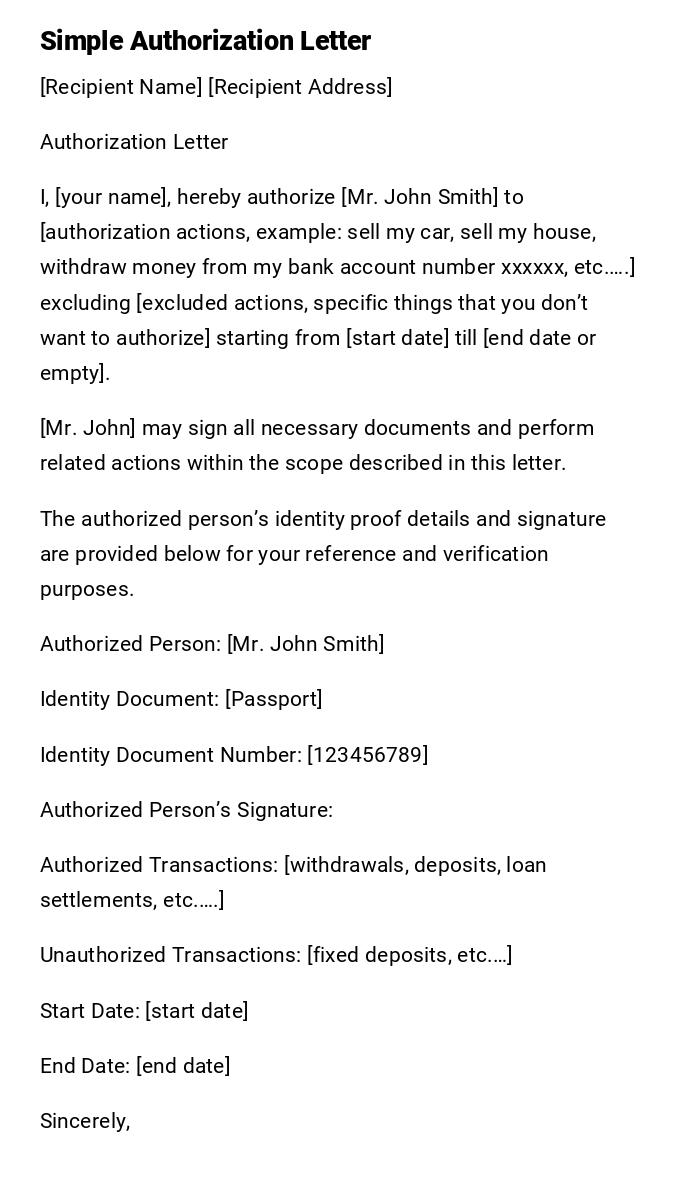
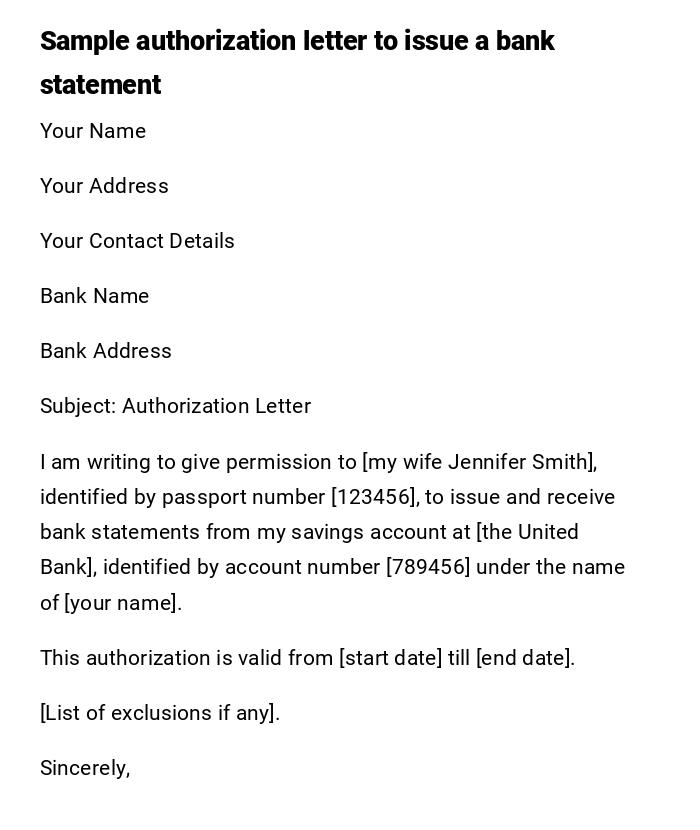
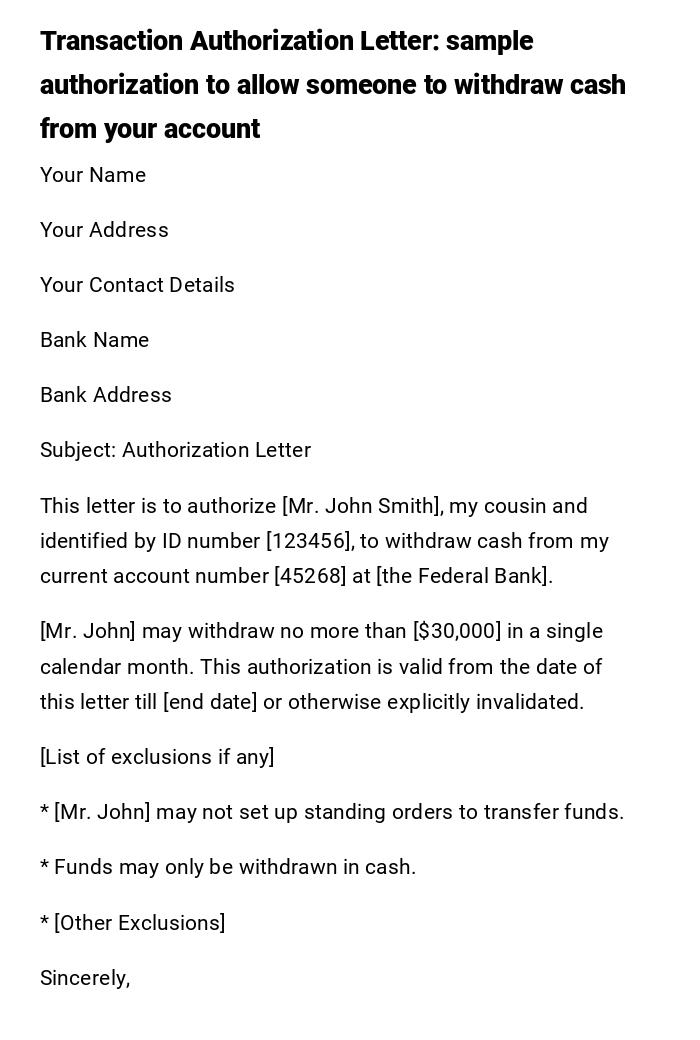
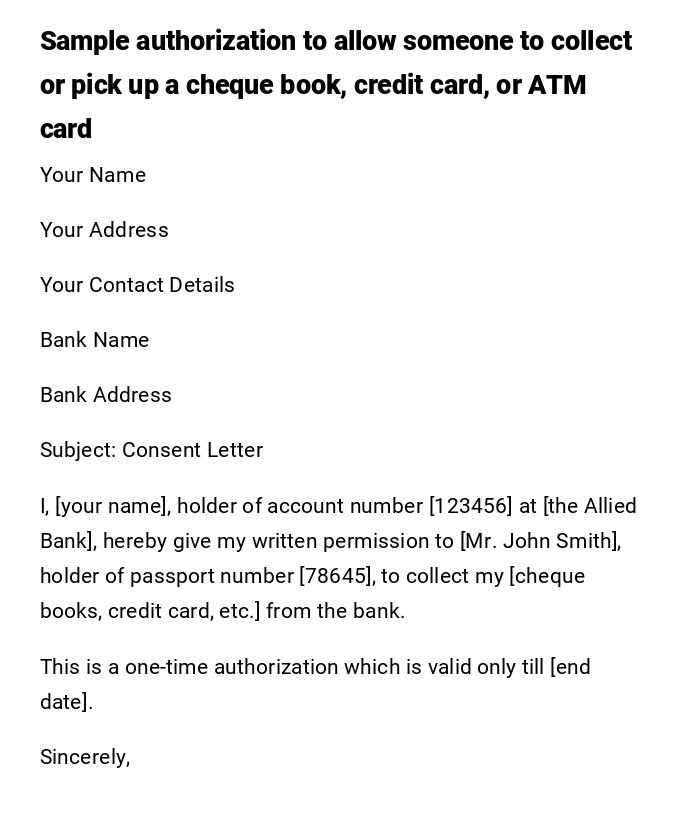
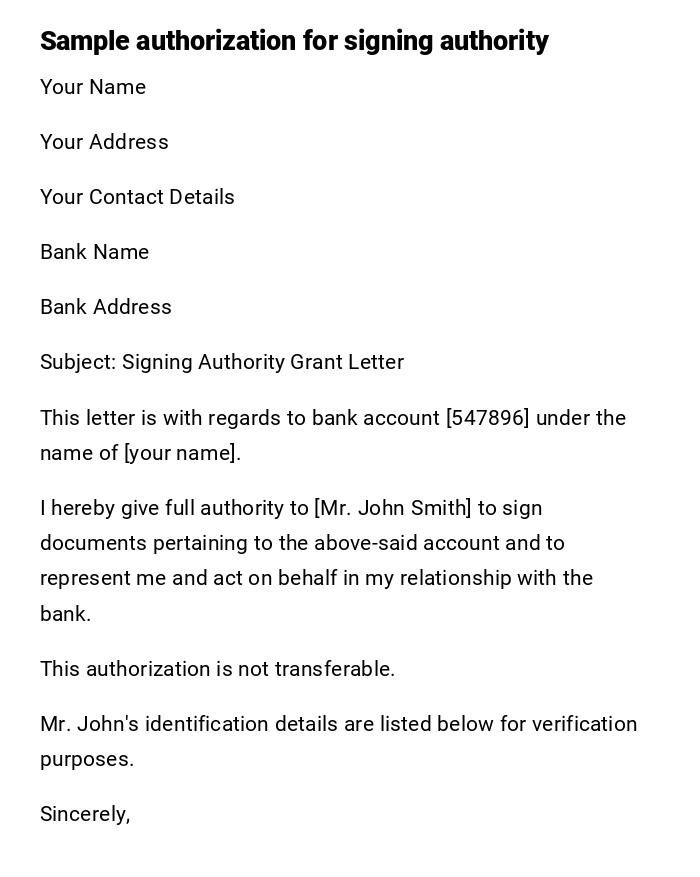
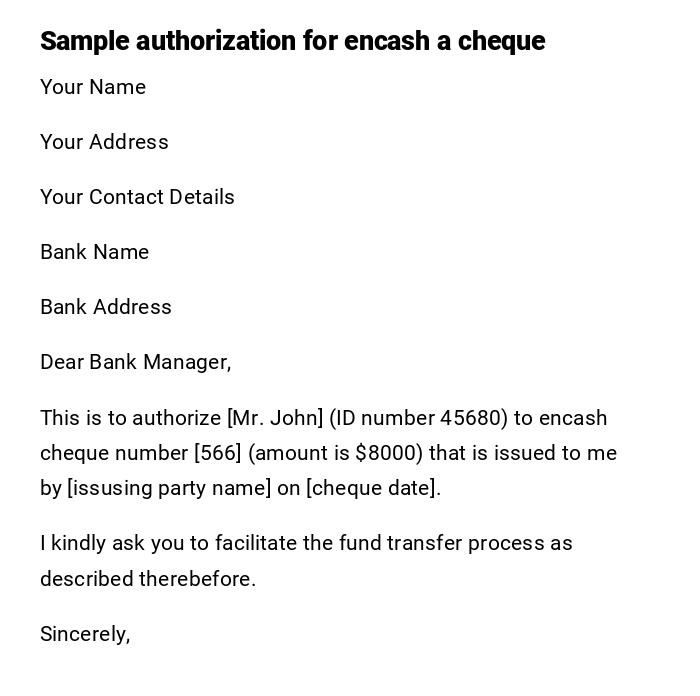
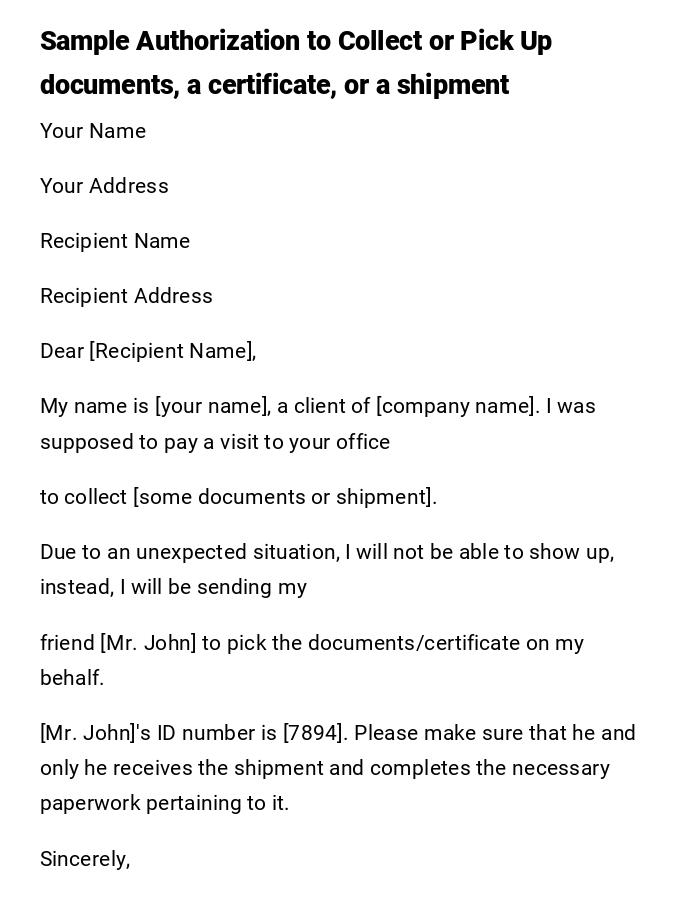
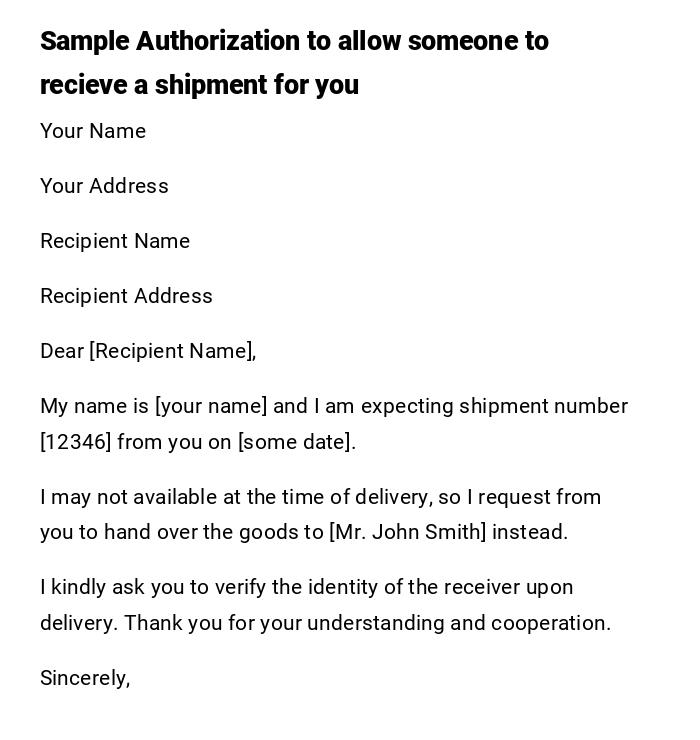
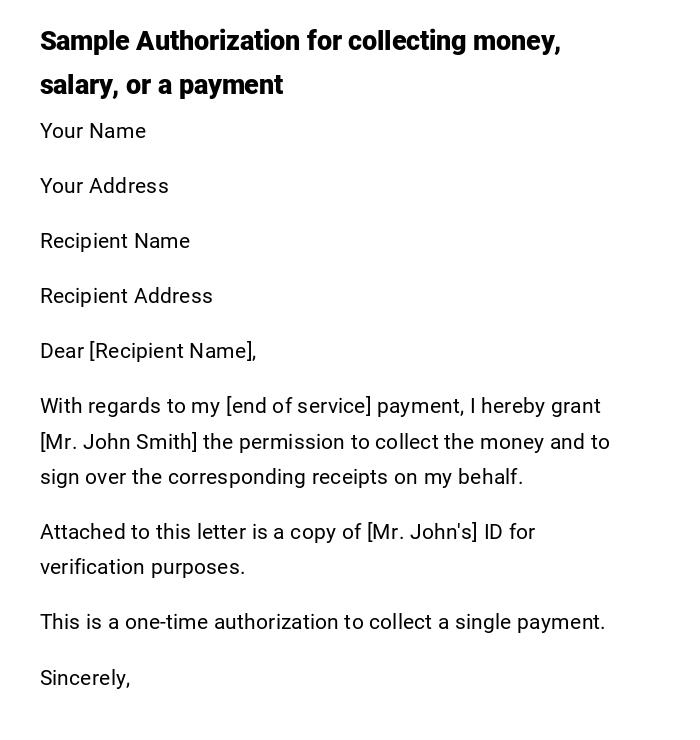
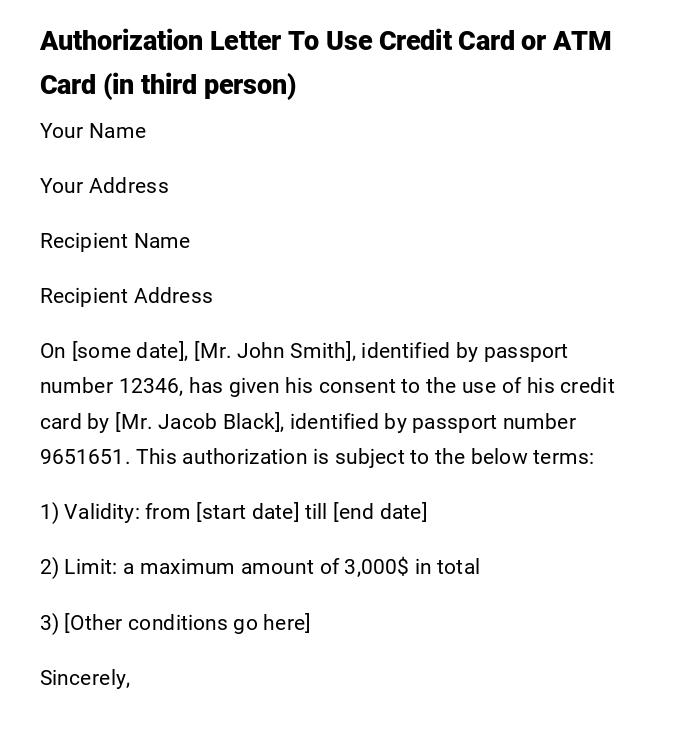
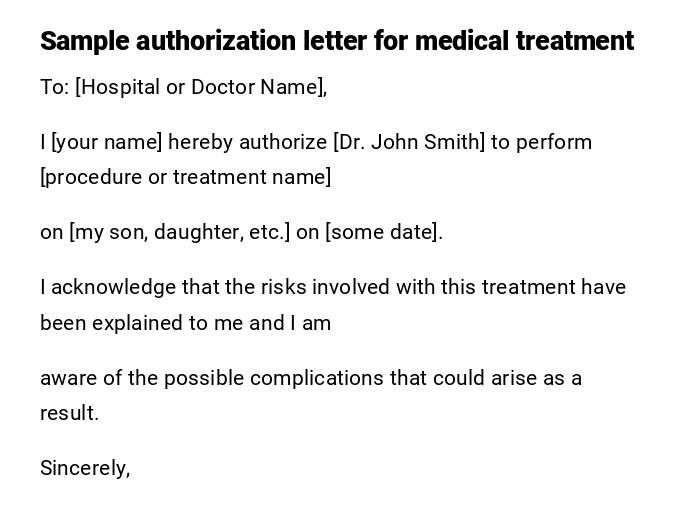
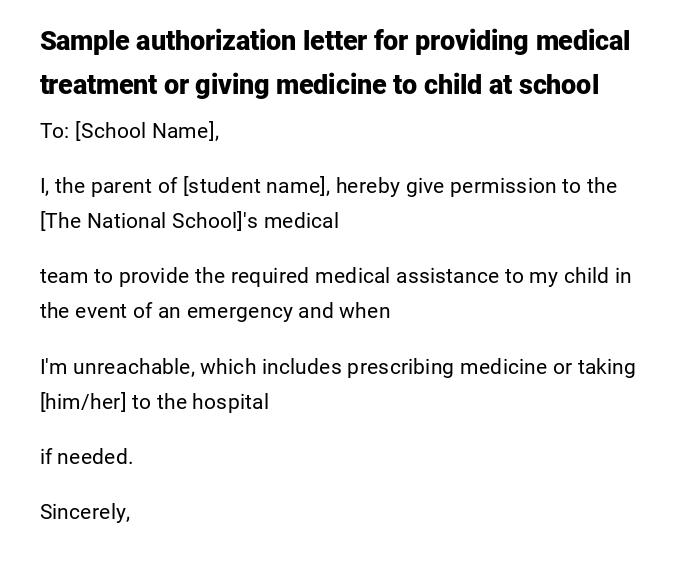
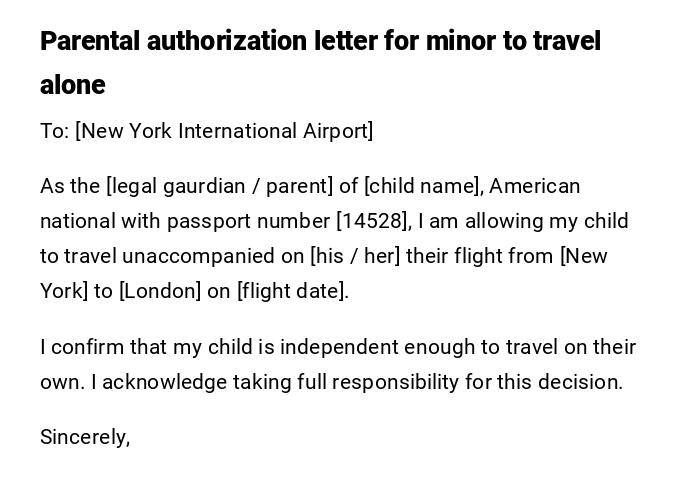
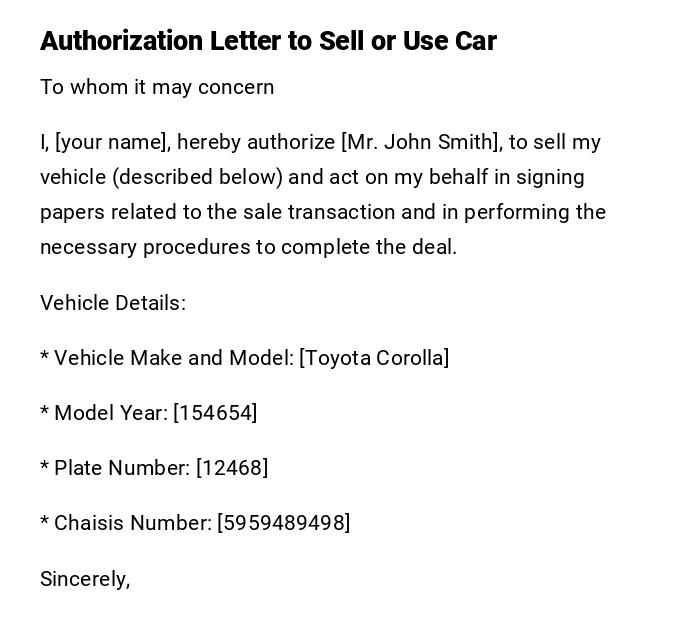
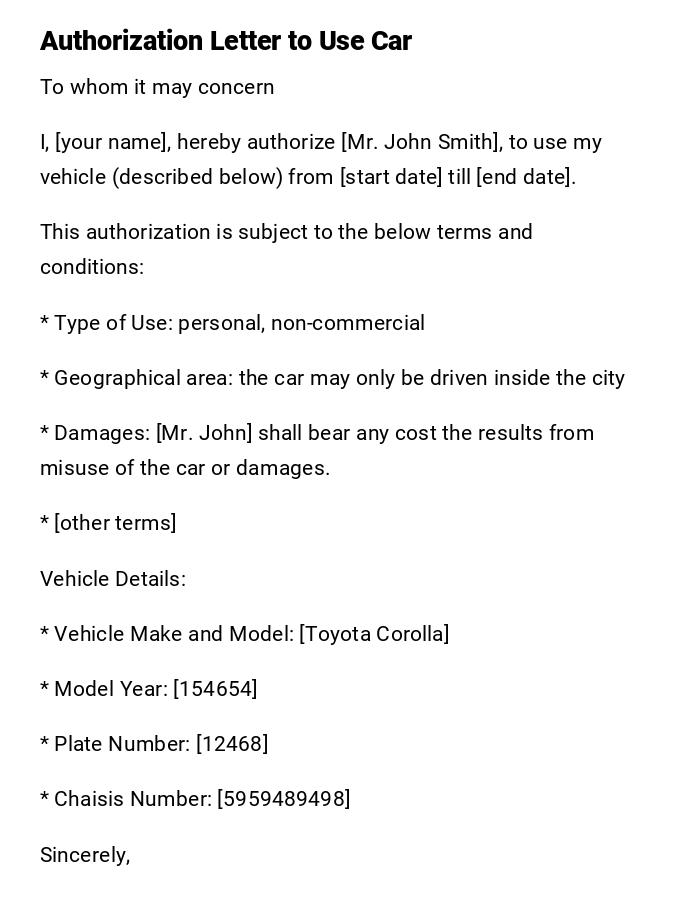
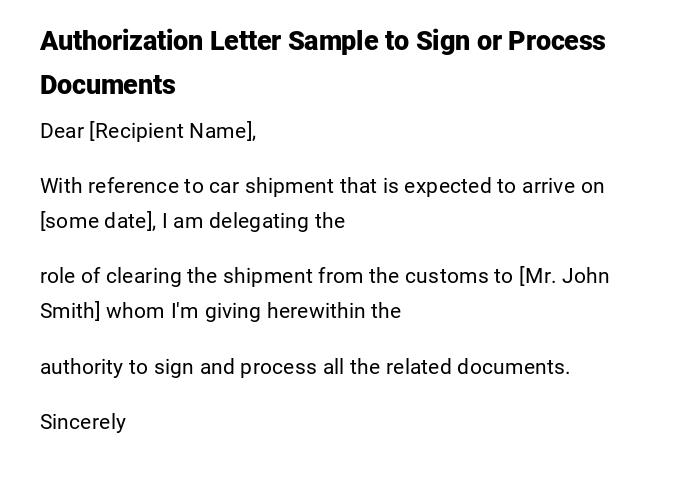
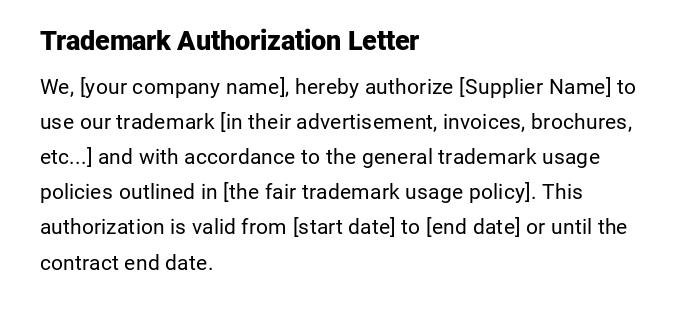
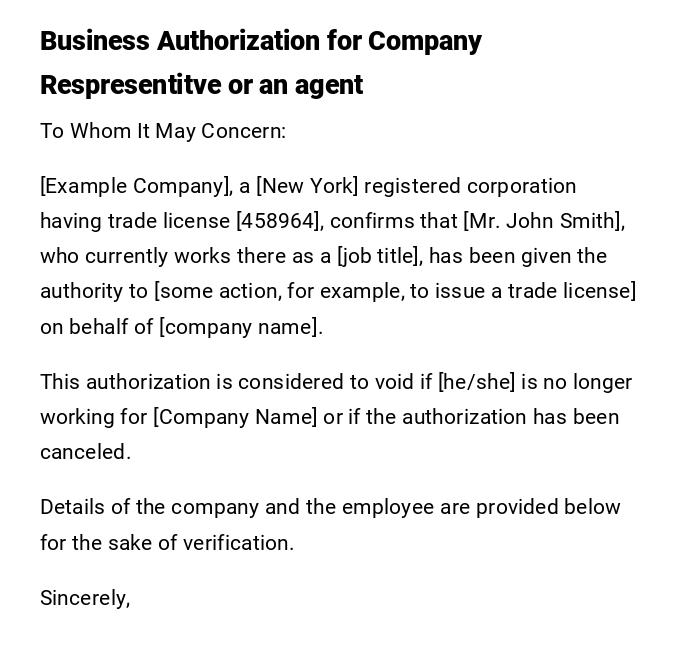
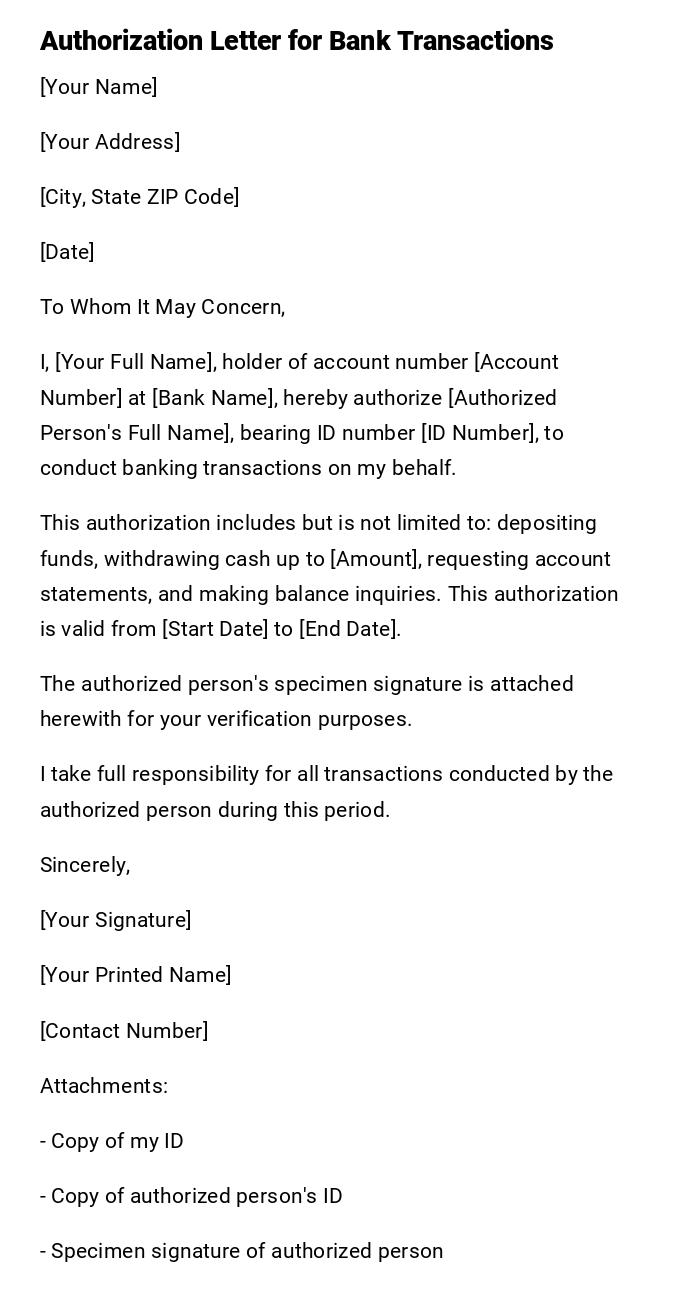
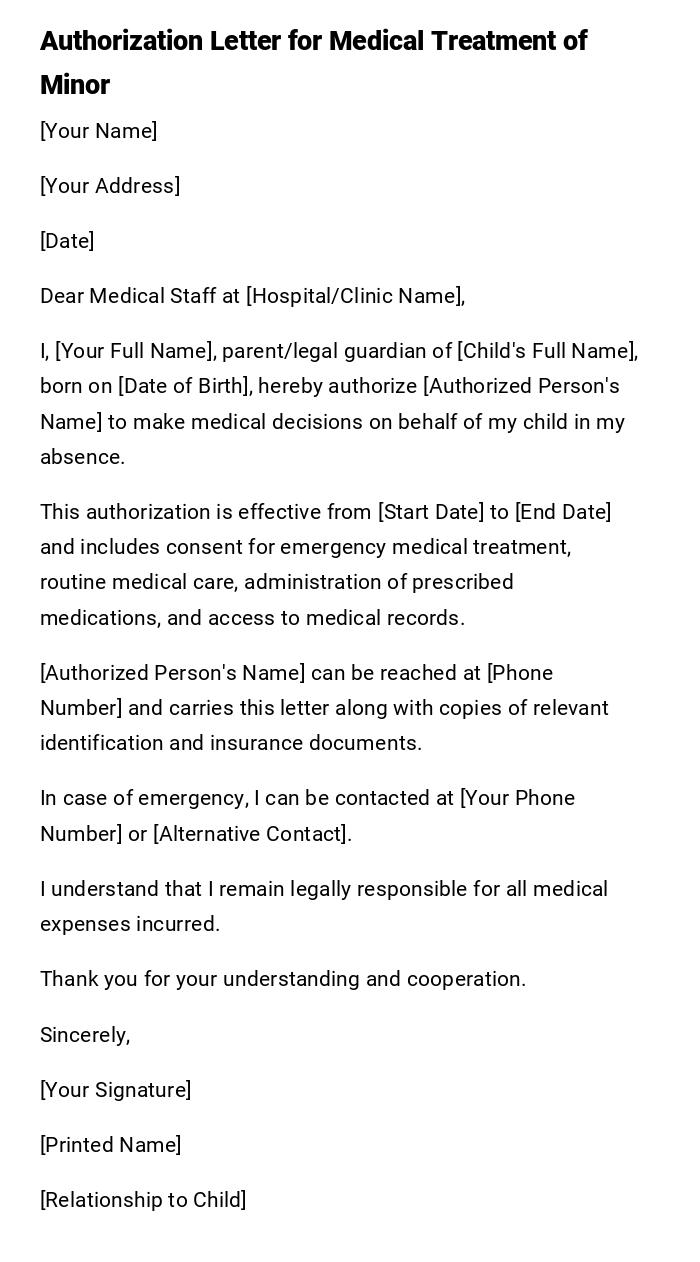
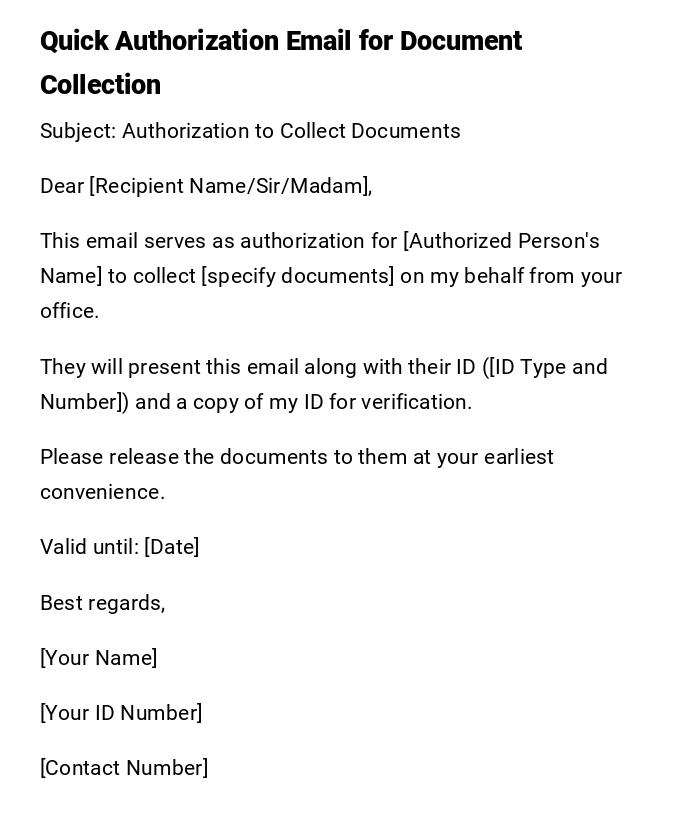
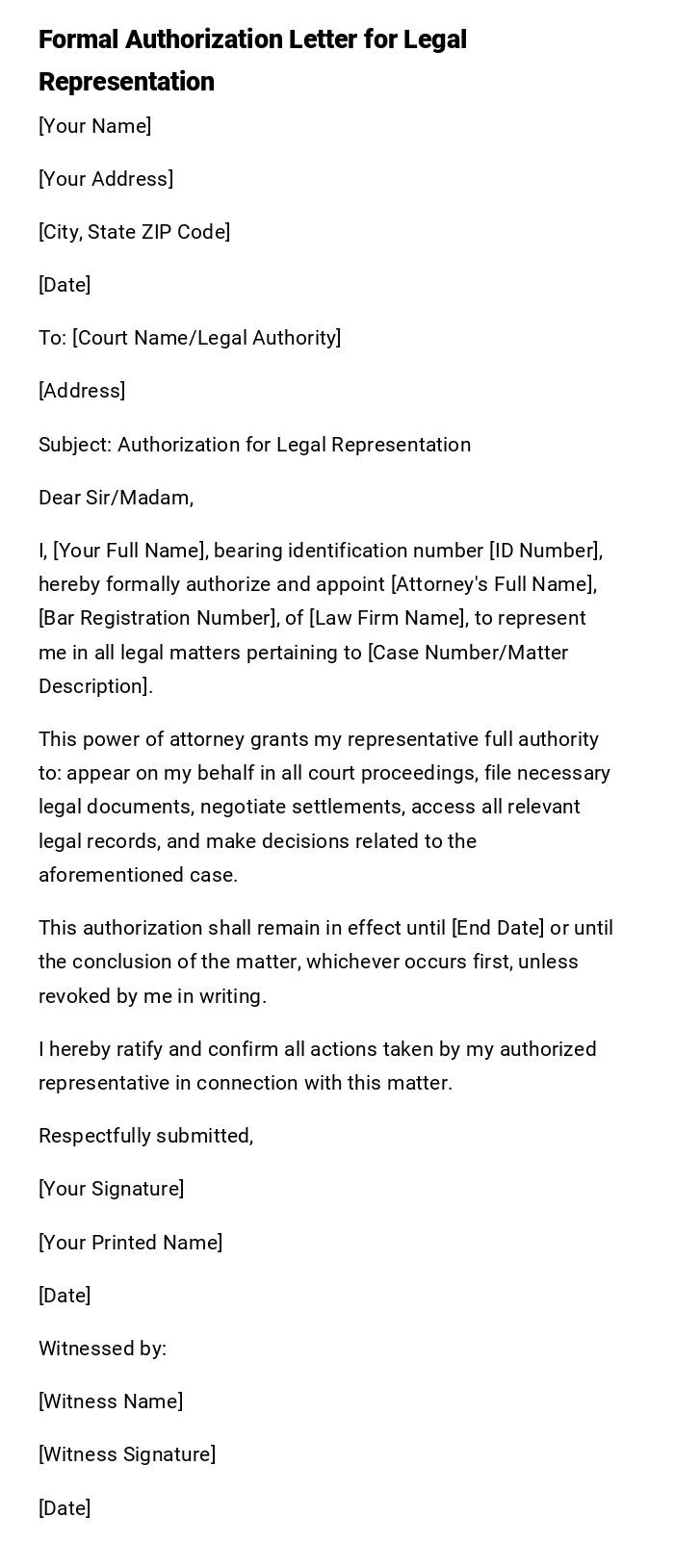
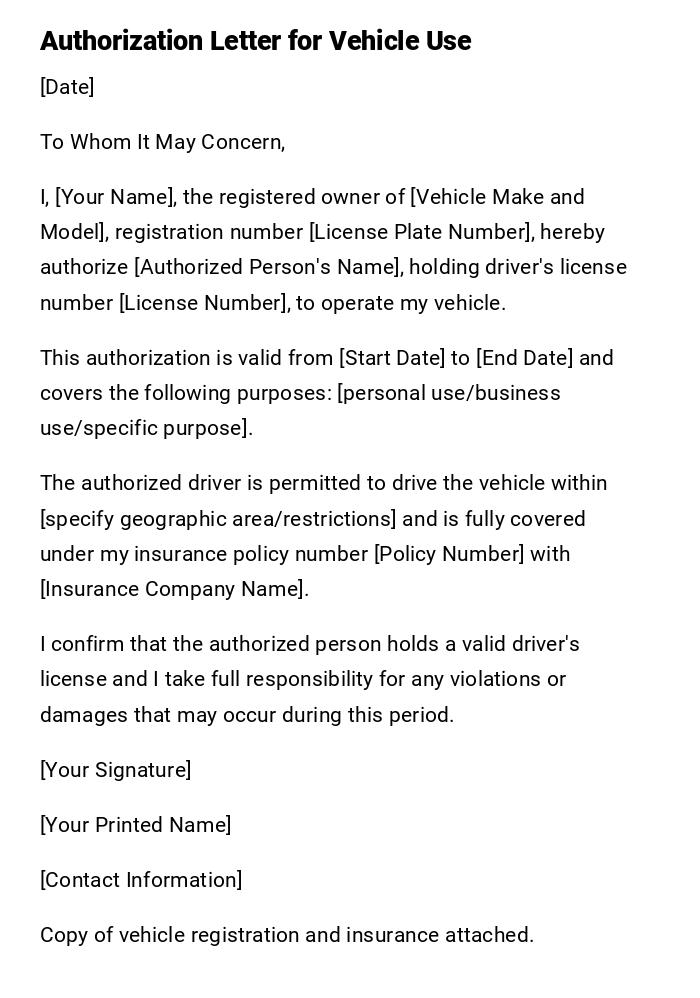
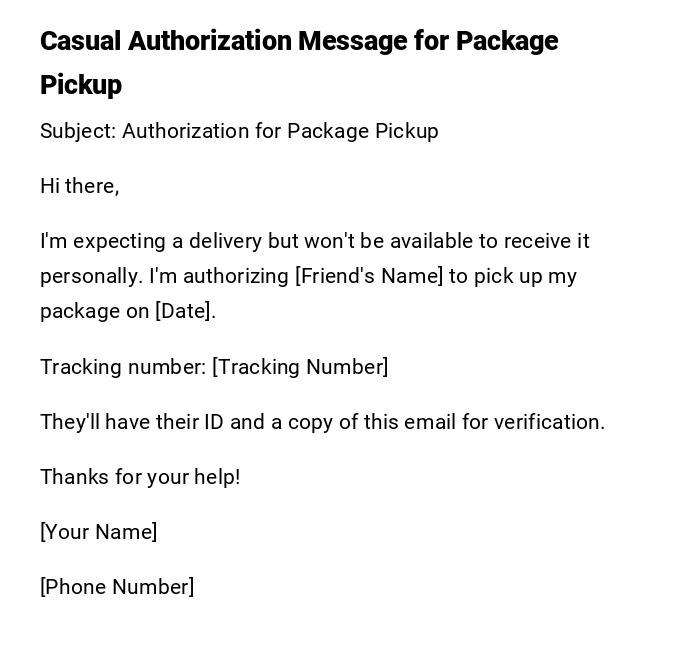
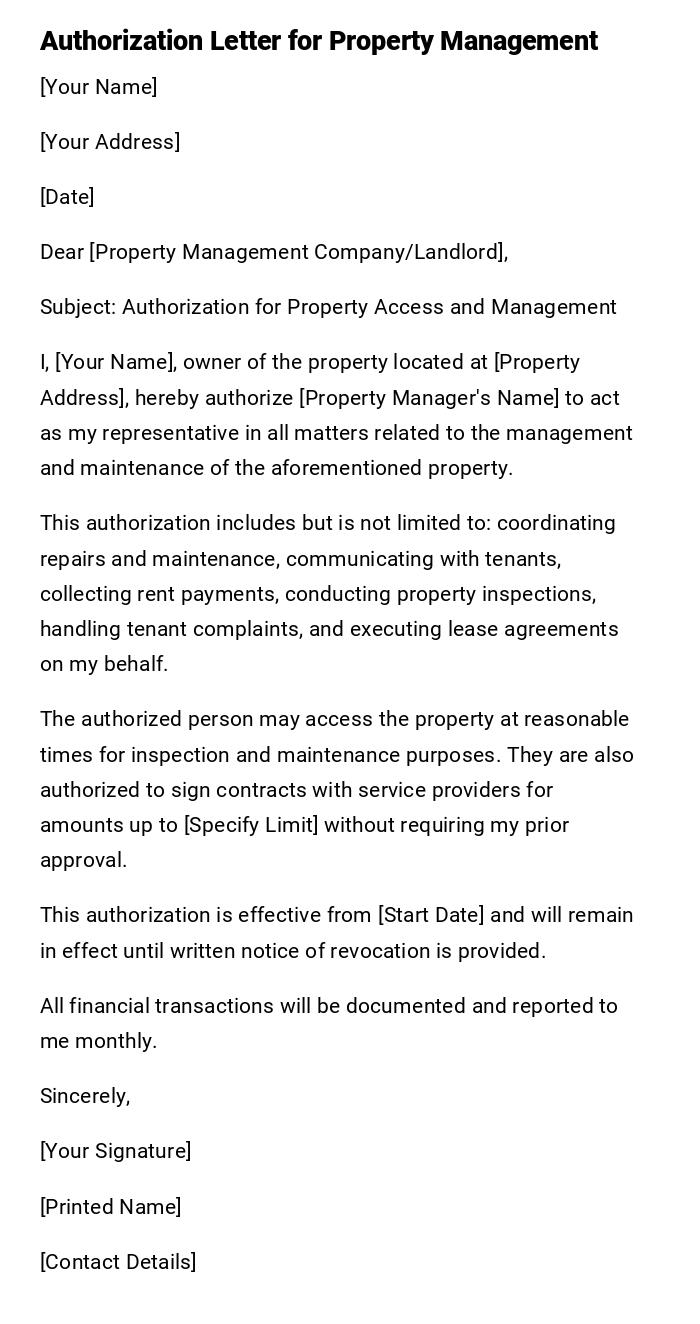
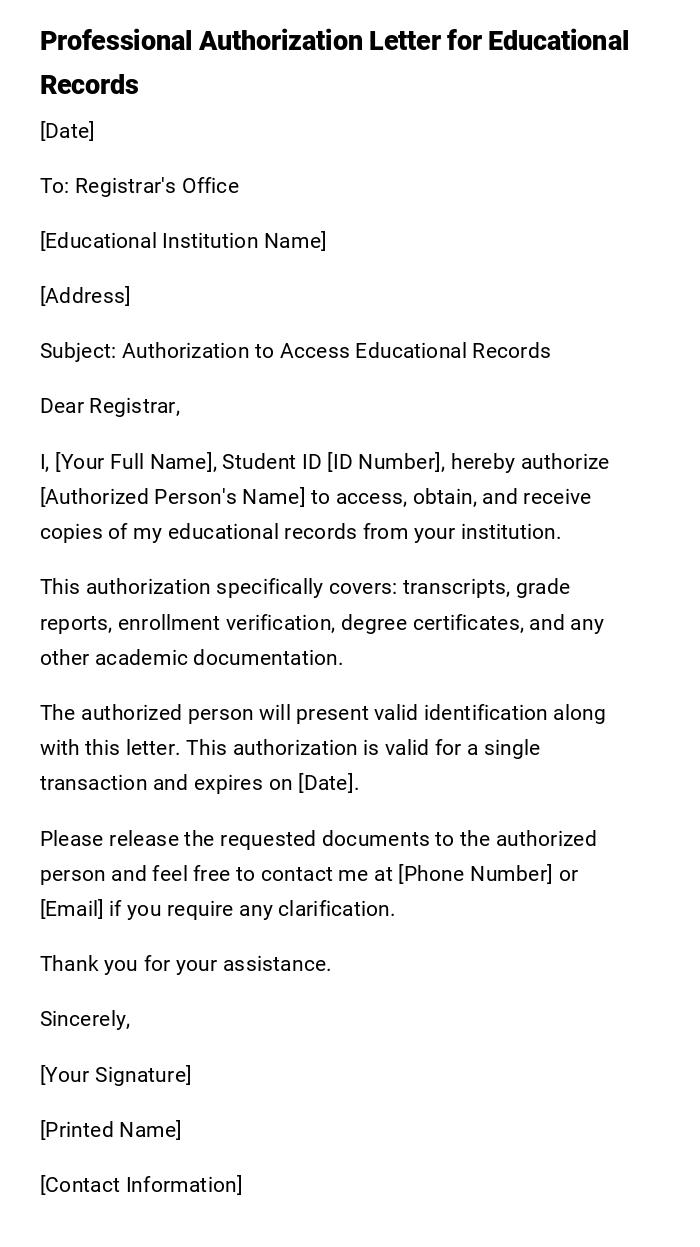

 Download Word Doc
Download Word Doc
 Download PDF
Download PDF